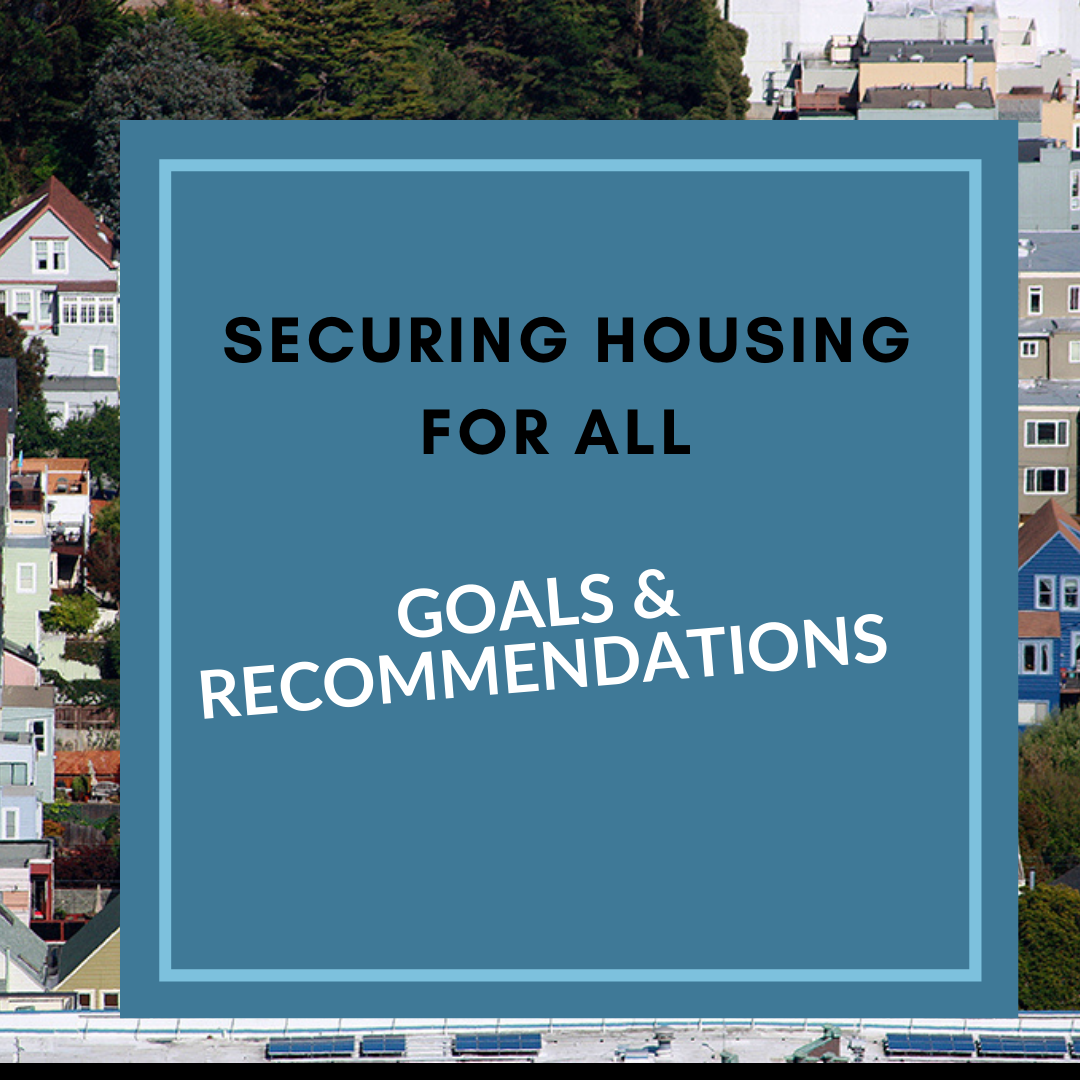Securing Housing Justice for All

In the United States, your zip code is a key predictor of your life outcomes. This is particularly true for people of color due to centuries of racist policymaking. Access to safe and permanently affordable housing is at the crux of this reality. With skyrocketing housing costs, rising homelessness, and millions living in substandard housing, the nation is in the midst of the worst housing crisis since the Great Depression. At the same time, federal housing programs are facing severe funding cuts that threaten to undermine housing security for more households. Even before the pandemic, over 40 million US households had to spend over 30 percent of their income on housing, and half a million people were unhoused. Less than 1 percent of housing is both affordable and accessible to people living with disabilities. Women of color suffer the highest eviction rates and cost burden, and Black and Indigenous people face the highest rates of homelessness.
The economic and health emergencies brought on by the pandemic have further exposed the deep failings of our housing system. As of August, more than one-third of all people living in the United States were late on housing payments due to the pandemic, and an estimated one in every five renters are at risk of eviction. Affordable housing providers and small landlords are facing increasingly tight margins, and many renters may never be able to recover from past-due rent debt. Our public health and economic recovery strategies must center housing as a human right for all people living in the United States, and particularly communities that have been marginalized and systemically stripped of their housing rights.
Our housing policy must guarantee housing as a human right, not a good to be commodified, profited from, and monopolized. Federal leaders must center racial equity and in doing so, serve people most in need. Historical harm caused to Black, Indigenous, and communities of color must be repaired by actively dismantling and providing restitution for a legacy of racist exclusion and exploitation. And as our current climate crisis continues to disproportionately affect lowincome communities and communities of color, we must take every immediate action plausible to simultaneously shore up decades of planned and racist neglect in needed maintenance and capital investment in our public housing stock while curbing the environmental impacts of buildings on climate change.
Goals
- Increase the supply of permanently affordable, community-controlled housing/social housing
- Reduce the number and proportion of economically insecure people who are rent burdened
- Expand the number of tenants with housing protections and/or rent control
- End housing discrimination and criminalization limiting access to housing Advance policies that constrain financial speculation in the housing market
Recommendations
First 100 Days
- Establish a nationwide eviction/foreclosure moratorium that will last until the end of the public health crisis. The Centers for Disease Control and Prevention has passed a national eviction moratorium for certain tenants and many states and jurisdictions have passed their own eviction and foreclosure moratoriums, but this patchwork response is insufficient and inconsistent in implementation. Executive action is necessary to create a national, uniform moratorium on evictions and foreclosures. This should also include a moratorium on utility shutoffs and restoration of any shutoff services.
- Restore the Affirmatively Furthering Fair Housing (AFFH) rule. The Department of Housing and Urban Development (HUD) should immediately reinstate and require full enforcement of the 2015 Obama-Biden AFFH rule to assess and address health disparities associated with housing and neighborhood exposures.
- Restore housing security for those currently under attack
- Protect mixed-status families. Block proposed Department of Housing and Urban Development amendments to the Housing and Community Development Act of 1980 that would prohibit “mixed-status families” from living in public and other subsidized housing.
- Reverse hateful discrimination against the LGBTQIA community. Instruct the Department of Housing and Urban Development to issue a notice against discrimination toward LGBTQIA individuals by recipients of federal dollars as it did under the Obama Administration, and specifically block amendments to the Equal Access Rule that would allow discrimination against transgender people.
- Protect mixed-status families. Block proposed Department of Housing and Urban Development amendments to the Housing and Community Development Act of 1980 that would prohibit “mixed-status families” from living in public and other subsidized housing.
- Reduce harm of policing in communities of color. Instruct the Department of Housing and Urban Development to eliminate policies that prohibit people with criminal records from living in federally subsidized housing and require the department to review admissions criteria of public housing authorities. Additionally, instruct the department to redirect financing for police presence in public housing to programs that prioritize support and safety for residents.
- Pass a national tenant bill of rights. In the midst of a pandemic, 40 million renters are at risk of eviction. Even before this pandemic, too many people were spending too much on rent. Congress should pass legislation to institute just cause, national rent control, and a right to legal counsel, and for tenants to form tenant associations and unions. Residents who have been displaced from their communities should have first priority to move into new affordable homes.
- Advance the Green New Deal for housing and plan for a just, green recovery. Issue an executive order instructing executive departments and agencies to begin planning for a just, green transition and economic recovery post-pandemic that includes a historic, green construction and rehabilitation or retrofit of millions of homes. Provide planning grants for communities at risk of climate change disasters to strengthen housing and infrastructure. Buildings are responsible for producing roughly one-third of emissions and pose one of our greatest leverage points for combatting the effects of climate change in the US. By investing in retrofitting and decarbonizing public housing, the nation could simultaneously take critical steps toward ensuring that every resident living in public housing has access to a safe, healthy home while reducing water costs by roughly 30 percent and lowering energy costs by 70 percent. For more information, please see Data for Progress.
- Advance the Homes for All Act and invest in housing. Prior to the Covid-19 pandemic, there were nearly 12 million renter households who were extremely cost burdened (paying more than 50 percent of their income on rent), and millions more were experiencing homelessness. Learning from the scale of large social housing programs around the world, the federal government should prioritize the creation of 12 million new housing units over the next 10 years, prioritizing low-income communities and communities of color.
- Strengthen the AFFH Rule. Federal leaders should also explore strategies to update the AFFH rule, tool, and mechanics in light of the initial experience of HUD and its grantees. HUD has the opportunity to publish AFFH data immediately, expand/refine the data, and improve guidance and tools for grantees. HUD should engage other domestic policy agencies in a coordinated approach to accomplish the rule’s core ambitions and should establish new interagency structures to bring all relevant federal departments together for this work.
Long-Term Priorities
- Reduce the influence of Wall Street on housing. Corporate landlords are expanding their reach from multifamily apartment buildings in high-rent cities to student housing, manufactured home communities, low-rent apartment complexes, and single-family homes nationwide. The practices of these private equity players, who seek to profit from displacement and gentrification, have led to deteriorating conditions and rising housing costs for low-income and working-class tenants who live in their buildings. More robust financial regulations will protect both tenants and homebuyers by limiting the role that private equity can play:
- Bring an end to government support for, and sales to, the predatory corporations buying up homes and communities.
- Repeal or amend Opportunity Zones legislation to facilitate community-driven public investment in affordable housing and other community needs.
- Enforce strong regulation, including transparency and fair taxation, of real-estate development and investment corporations.
- Provide funding and policy preference for nonprofit and cooperative ownership, community land trusts and other models that facilitate public and resident ownership.
- Limit the ability of banks to offer loans on property purchases that would require significant rent increases in order to meet mortgage obligations.
- Bring an end to government support for, and sales to, the predatory corporations buying up homes and communities.
- Pay reparations for centuries of racist housing policies. Housing, by location and design, must foster the inclusion of its residents regardless of race, gender identity, sexual orientation, income, legal status, physical ability, or whether or not someone lives in a home or on the street. Historically marginalized communities must lead in decision-making related to housing and community development. This moment demands that our federal government commit to a system of reparations to address the historic theft of Indigenous lands and intentional exclusion of Black and Brown people from our housing system, including principal reduction and zero interest loans to Black, Indigenous, and other people-of-color communities impacted by racist housing and land policies.
- Amend federal program formulas and guidelines to promote equitable housing outcomes. As cities and states seek long-term recovery from the Covid-19 pandemic and escalating natural disasters related to climate change, flexible funding sources must be targeted to ensure that communities most impacted by pre-existing and exacerbated inequities—namely low-income communities and communities of color—have access to resources to rebuild more equitably. All funding should be tied to racial equity results and should prioritize investment in regions most impacted by economic crises and natural disasters, and in communities experiencing deep racial, health, and economic disparities. Guidelines for federal housing programs should be amended to prioritize capacity building and technical assistance to partnerships of local nonprofit providers and their jurisdictions; require public engagement and community governance over use of funds; and balance regulatory guardrails with opportunities for innovation—as long as racial equity benchmarks are set and made progress toward within a realistic timeframe. This should include but not be limited to federally supported housing programs, like community development block grants, or regulation of private lending under the Community Reinvestment Act.
Covid-19 Response
- Cancel rent debt and provide relief to homeowners, affordable housing providers, and small landlords. Ensure that all Americans can remain in their homes as the nation addresses Covid-19 and recovers economically by canceling rent debt and home mortgage payments through the duration of the pandemic and for a period of time afterward, for residents who will never be able to afford to pay it back. Make additional relief available to nonprofit, deed-restricted affordable housing providers, as well as small landlords who often face tight margins and provide relief for the millions who have already been evicted, had wages garnished, or been displaced because of Covid-19 evictions. Mortgage payments for homeowners, affordable housing providers, and small landlords should be reduced to zero and interest accrual suspended, prioritizing owner-occupied homes, nonprofit affordable housing providers, Project-Based Section 8, HUD housing, LIHTC, and small landlords who are “natural persons,” i.e., not corporations. Require all landlords accessing mortgage forbearance or forgiveness to cancel rent, and provide automatic lease renewal.
- Create and capitalize an acquisition fund to stabilize low-income housing stock and avoid speculation on homes. Create an affordable housing acquisition fund to fully finance the purchase of private rental properties by nonprofit organizations, public housing authorities, cooperatives, community land trusts, and states or local governments in order to increase the availability of affordable housing. Dedicate $200 billion to acquire existing, distressed, and at-risk units and convert to community control and permanent affordability. Funding should be flexible enough for local recipients to tailor distribution based on the needs of local communities if it establishes racial equity benchmarks. Funds should be accompanied by hands-on technical assistance that facilitates peer learning. If recipients can demonstrate progress toward racial equity benchmarks in a realistic timeframe, long-term resources should continue to flexibly strengthen community-controlled land and housing.
- End homelessness by increasing funding to provide homes and expand services for all people experiencing homelessness. People who are unhoused and contract Covid-19 are more likely to be hospitalized and require critical care. Without addressing the needs of this population, as many as 20,000 people who are homeless could require hospitalization, which could also exacerbate the spread of the virus and overwhelm hospital systems. Congress took an important first step by providing $4 billion in Emergency Services Grants in the CARES Act, but at least another $11.5 billion—that can also be applied to more permanent housing solutions—is necessary to respond to the homelessness crisis.
For more information on policy priorities, please see the Alliance for Housing Justice National Platform, the Homes Guarantee, and Our Homes, Our Health.
Conclusions
As the nation anticipates political change and heals itself from Covid-19 and the resultant economic crisis, the next Administration will be met with a particularly impactful moment to deeply transform our nation’s housing systems for communities who have experienced persistent and worsening marginalization. It can meet that moment by ushering in an era of housing security and a just economic recovery.

